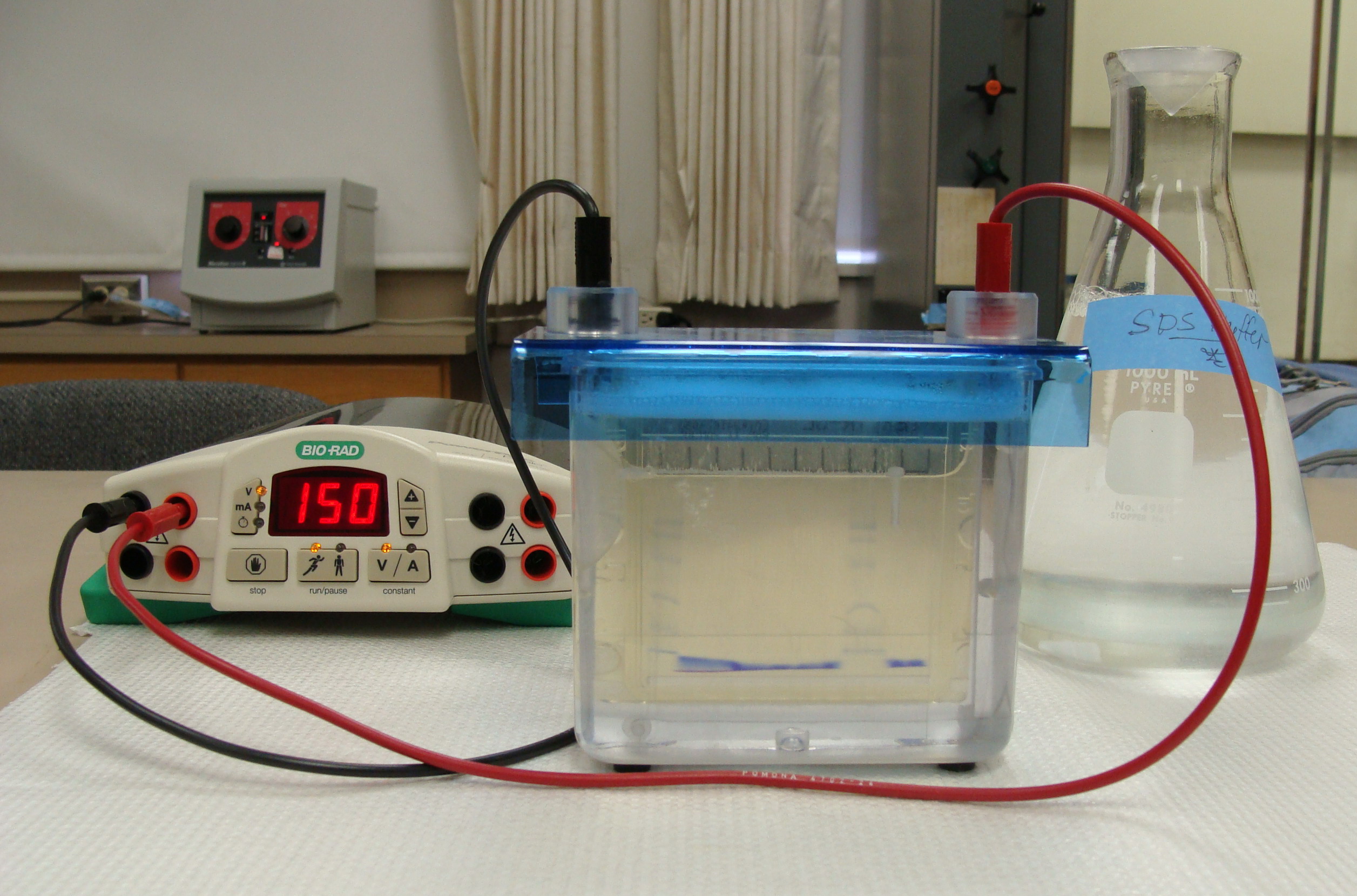BIOL 1406
PreLab
8c.3
How should I dilute the milk fractions containing 2X sample
treatment buffer so that no fraction has a protein concentration greater than
1.25 µg/µL?
|
 |
It is important to load an appropriate amount of protein into each well of your
electrophoresis gel. If too little protein is loaded, it may be difficult or
impossible to see many of the protein bands after the gel is stained. On the
other hand, if too much protein is loaded, the bands may become too wide causing
them to overlap and form a smear. In general, the optimum amount of protein to
load into each well is about 20 μg.
Also keep in mind that there is a limit to the volume of sample that can fit
into each well on your gel. To avoid overfilling the wells, it is best to load
about 16 μL of sample into each well. This means that, ideally, 16
μL of sample
should contain 20 μg of protein. Therefore, each sample that you load onto your
gel should have a protein concentration of 20 μg/16
μL, or 1.25 μg/μL. |
| Lab set-up for SDS-PAGE |
|
With this in mind, examine the calculated protein concentrations of the undiluted
milk fractions containing 2X sample treatment buffer. This information can
be found in the third table from Prelab 8c.2. You should have printed a
copy of Prelab 8c.2 after you finished entering your data and the results of
your calculations. There are 3 possible cases:
- The protein concentration equals 1.25 μg/μL. In this case, the sample has the
desired protein concentration. Simply load 16 μL of the milk fraction into the
well, and the well will contain the optimum amount of protein (20
μg.)
- The protein concentration is less than 1.25 μg/μL. In this case, the protein
concentration is lower than desired. Unfortunately, there is no easy way to
increase the protein concentration of your sample. The best you can do is use
the sample with no dilution and load the maximum amount of sample that the well
can hold (16 μL). Keep in mind that your well will have less than the optimum
amount of protein, meaning some of the protein bands on your gel may be very
light or invisible after staining.
- The protein concentration is greater than 1.25
μg/μL. In this case, the milk
fraction should be diluted with 1X sample treatment buffer to produce a sample
with a protein concentration equal to 1.25 μg/μL. For this dilution, calculate
how much of the milk fraction with 2X sample treatment buffer and how much 1X
sample treatment buffer should be combined to make 40
μL of sample with a final
protein concentration of 1.25 μg/μL. After you have prepared 40
μL of the
diluted sample (containing 1.25 μg/μL of protein), you will load 16
μL of this
sample into the well and discard the remaining 24 μL.
Fill in the table below to show how you will dilute the milk fractions
containing 2X sample treatment buffer. For a review of how to do the
calculations for parallel dilutions, see
Prelab 2.4. The initial protein concentration for
each fraction can be found in the third table from Prelab 8c.2. The final volume
of your diluted sample should be 40 μL and the final protein concentration
should be 1.25 μg/μL. In each case, your diluting solution will be 1X sample
treatment buffer. For those fractions that already have a protein concentration
of 1.25 μg/μL or less, simply write “no dilution necessary”.
 IMPORTANT: After you have completed the table below, use the print button on your browser to print a copy of the table and
then bring it to lab. If you do not have a printer, copy the information
by hand into your lab notebook.
IMPORTANT: After you have completed the table below, use the print button on your browser to print a copy of the table and
then bring it to lab. If you do not have a printer, copy the information
by hand into your lab notebook.
 NOTE: The answers provided in the table below were calculated using the answers
provided in the third table for Prelab 8c.2. Your results for the nonfat milk
should be very similar to the answer given below while results for the pellet,
whey, and column fractions will show greater variability from group to group.
NOTE: The answers provided in the table below were calculated using the answers
provided in the third table for Prelab 8c.2. Your results for the nonfat milk
should be very similar to the answer given below while results for the pellet,
whey, and column fractions will show greater variability from group to group.
 REMINDER: After you have completed the table above, use the print button on your browser to print a copy of the table and
then bring it to lab. If you do not have a printer, copy the information
by hand into your lab notebook.
REMINDER: After you have completed the table above, use the print button on your browser to print a copy of the table and
then bring it to lab. If you do not have a printer, copy the information
by hand into your lab notebook.
Close this browser window to return
to Blackboard and complete the practice quiz and assessment quiz.
